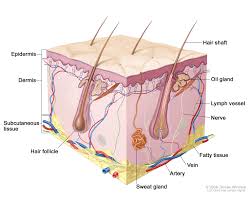中文词源
skin 皮肤,兽皮,毛皮,剥皮
来自古诺斯语 skinn,兽皮,毛皮,来自 Proto-Germanic*skintha,分开,剥皮,来自 PIE*sken, 砍,切,来自 PIE*sek,砍,切,词源同 segment,shear.后词义通用化为皮肤。
英语词源
- skin
-
skin: [11] The ancestral English word for ‘skin’ is hide. Skin was borrowed at the end of the Old English period from Old Norse skinn (source of Swedish skin and Danish skind). The etymological notion underlying the word is of ‘peeling’ or ‘slicing’ off an outer layer (it goes back ultimately to a prehistoric Indo-European base *sken- ‘cut off’, which was an extension of *sek- ‘cut’, source of English section, sector, sickle, etc), and so it presumably referred originally to the pelts removed from hunted animals.
=> section, segment, sickle - skin (n.)
- c. 1200, "animal hide" (usually dressed and tanned), from Old Norse skinn "animal hide, fur," from Proto-Germanic *skintha- (cognates: Old English scinn (rare), Old High German scinten, German schinden "to flay, skin;" German dialectal schind "skin of a fruit," Flemish schinde "bark"), from PIE *sken- "to cut off" (cognates: Breton scant "scale of a fish," Irish scainim "I tear, I burst"), from root *sek- "to cut" (see section (n.)).
Ful of fleissche Y was to fele, Now ... Me is lefte But skyn & boon. [hymn, c. 1430]
The usual Anglo-Saxon word is hide (n.1). Meaning "epidermis of a living animal or person" is attested from early 14c.; extended to fruits, vegetables, etc. late 14c. Jazz slang sense of "drum" is from 1927. Meaning "a skinhead" is from 1970. As an adjective, it formerly had a slang sense of "cheating" (1868); sense of "pornographic" is attested from 1968. Skin deep is first attested in this:All the carnall beauty of my wife, Is but skin-deep. [Sir Thomas Overbury, "A Wife," 1613; the poem was a main motive for his murder]
The skin of one's teeth as the narrowest of margins is attested from 1550s in the Geneva Bible literal translation of the Hebrew text in Job xix:20. To get under (someone's) skin "annoy" is from 1896. Skin-graft is from 1871. Skin merchant "recruiting officer" is from 1792. - skin (v.)
- late 14c., "to remove the skin from" (originally of circumcision), from skin (n.). As "to have (a particular kind of) skin" from c. 1400. In 19c. U.S. colloquial use, "to strip, fleece, plunder;" hence skin-game, one in which one player has no chance against the others (as with a stacked deck), the type of con game played in a skin-house. Skin the cat in gymnastics is from 1845. Related: Skinned; skinning.
权威例句
- 1. If your skin becomes red, sore or very scaly, consult your doctor.
- 如果皮肤发红、瘙痒或脱皮,要向医生咨询。
- 2. Daily facial exercises help her to retain the skin's elasticity.
- 每天做面部运动帮助她保持皮肤弹性。
- 3. He won, but only by the skin of his teeth.
- 他赢了,但是赢得十分勉强。
- 4. Eczema is a common skin complaint which often runs in families.
- 湿疹是一种常见的皮肤病,通常具遗传性。
- 5. Helen's choice of lipstick was a good match for her skin-tone.
- 海伦选择的唇膏很适合她的肤色。

